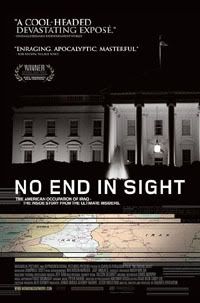Movie Review: No End in Sight (2007)

No End in Sight (2007)
Starring: Campbell Scott [narrator], General Jay Garner, Ambassador Barbara Bodine, Richard Armitage, Robert Hutchings, Colonel Lawrence Wilkerson, Colonel Paul Hughes
Directed by: Charles H. Ferguson
I'll admit, like most people, I sat out this year's collection of Iraq films. Partially, I'm little exhausted by the whole thing, as all the outrage in the world seems to matter very little, and the situation is so intractable that every solution appears to be the wrong one. But more than that, none of the fictional movies on the war have been well received, be it In the Valley of Elah, Redacted, Rendition, or Lions for Lambs. The only Iraq movie I had any interest in seeing was this very well received documentary, but wasn't able to in the two weeks it played in theatres.
My instincts proved correct, at least in terms of making a point of seeing No End in Sight, which provides a detailed look at the early stages of the Iraq war in 2003, chronicling the litany of mistakes by the U.S. government that led to the quagmire it now finds itself in. Director Charles H. Ferguson, a political scientist with a PhD from MIT, was originally a supporter of the war, only to become disillusioned by the historic blunders in the post-invasion phase of operations. Thus, he cannot simply be dismissed as a partisan propagandist looking to score easy points by showing clips of Bush's silliest quotes.
Instead, Ferguson uses his connections to get first-person accounts from people involved in post-invasion Iraq, including ORHA director General Jay Garner, who was originally put in charge of post-war reconstruction efforts before being replaced by L. Paul Bremer, and Richard Armitage, the US Deputy Secretary of State during the war. Ferguson's presentation of facts and first-person accounts of the war gives a more clinical examination of the war than other flashier anti-war docs, but still delivers a damning condemnation of the government's failures along the way.
The perspective is a little different from docs like Fahrenheit 9/11, in that it doesn't focus too heavily on the lead up to war, but instead focuses on the mistakes after the invasion, suggesting that the war may have taken a much more different turn if fatal mistakes weren't made. For anyone who has paid attention to the war, this isn't new information, but the presentation makes for a strong argument. I had to pause the movie at one point due to my extreme frustration over old news, with the movie somehow finding untapped levels of incredulity buried deep within me after years of bitter disappointment and cynical detachment. Because no matter how many years pass, it's still hard to believe that the Bush administration could be stupid enough to disband the Iraq military, thus putting thousands of trained and armed Iraqis out of work and looking to settle scores.
I probably should stop there, before this review devolves into a bitter rant on the events of the past five years, especially when there's an excellent documentary out there to recommend that will make my points far more cogently and effectively. I know Hollywood's current obsession with cranking out quickie message movies on the subject has worn most of us down, but this thoughtful, detailed, and damning documentary is worth the time.
4.5/5
Related Reviews:
Fog of War, The: Eleven Lessons from the Life of Robert S. McNamara (2003)
War Tapes, The (2006)
Why We Fight (2006)